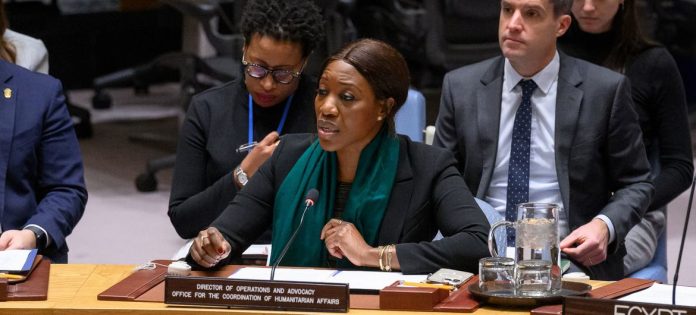Speaking before the Security Council on Monday, Edem Wosornu,Director of the Advocacy and Operations Division at the UN aid coordination office (OCHA) characterized the ongoing crisis as “a humanitarian emergency of immense proportions.”
This crisis, which Wosornu described as "man-made", has disrupted food systems and crucial infrastructure, placing millions at immediate risk.
Evidence of famine mounts
“Famine conditions have now been identified in five locations,” Ms. Wosornu announced, drawing attention to Zamzam, Al Salam, and Abu Shouk camps for internally-displaced persons, as well as the western Nuba Mountains.
The Food and Agriculture Organization (FAO) highlighted conflict and displacement as major contributors to food insecurity, "exacerbated by limited humanitarian access," according to Deputy Director-General Beth Bechdol.
The most recent Integrated Food Security Phase Classification (IPC) analysis emphasized the disproportionate impact on vulnerable groups, especially women, children, and the elderly.
The crisis has been exacerbated by disrupted food production and collapsing market conditions.
The IPC Committee has predicted that famine could spread to five additional regions, including Um Kadadah and El Fasher, by mid-2025, with 17 other areas at high risk without prompt intervention.
Ms. Bechdol alerted the Council to the severe consequences of such crises: “As we have seen in these extreme situations, thousands of deaths have occurred before the classification of famine.”
Recent assessments reveal that more than 16% of households in affected areas are currently facing severe food insecurity.
Challenges in aid distribution
Despite ongoing efforts, logistical hurdles continue to impede the distribution of humanitarian aid.
“On December 25th, a convoy of 28 trucks carrying food, nutrition supplies, and other aid arrived in Khartoum from Port Sudan," marking progress, explained Ms. Wosornu. However, obstacles persist.
“Critical areas in South Kordofan are effectively isolated from external assistance,” while “visas for humanitarian workers are not being issued promptly enough,” she noted.
New inspection procedures at the Adre crossing, vital for operations in Darfur, have further delayed aid delivery.
Almost 90% of displaced households are currently unable to afford food.
Urgent call for action
Both Ms. Wosornu and Ms. Bechdol made a plea for international assistance during the Security Council session.
They urged governments to prioritize funding, guarantee safe passage for relief efforts, and push involved parties to halt hostilities.
“Immediate and unimpeded” humanitarian access is crucial, stated Ms. Bechdol, for partners to effectively deliver “multi-sectoral humanitarian assistance”.




